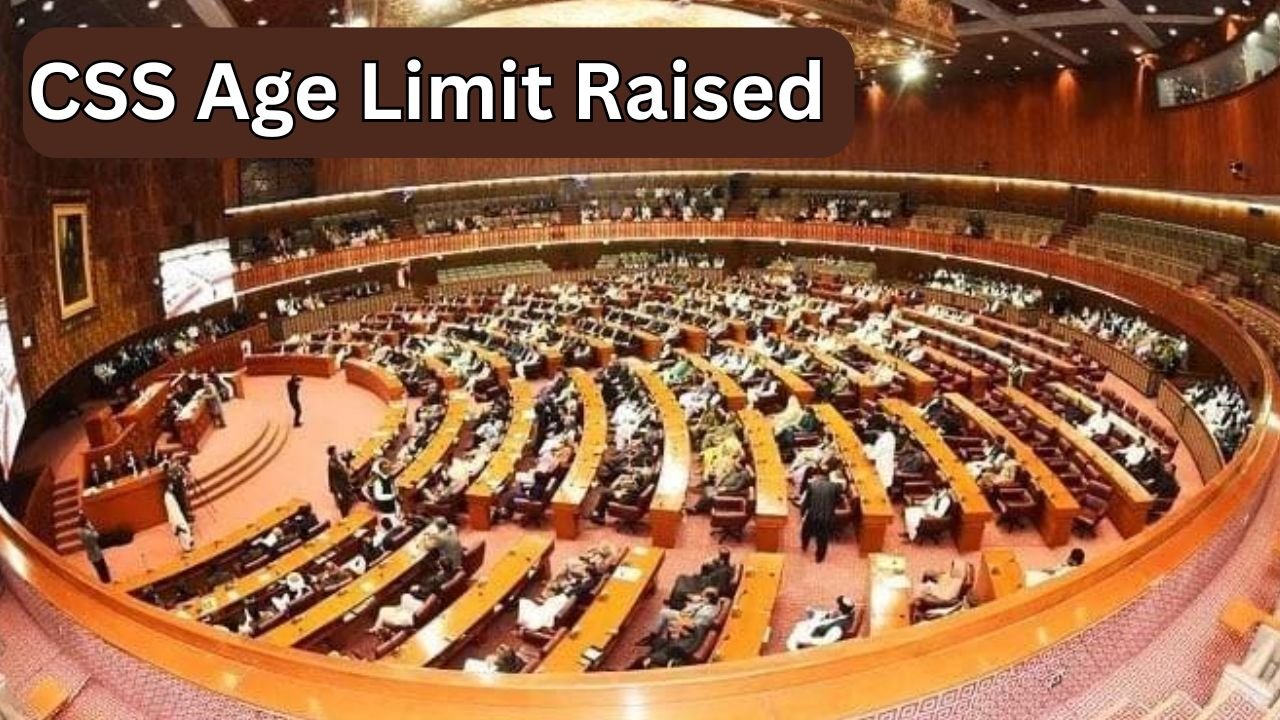The Central Superior Services (CSS) examination in Pakistan is a highly prestigious and competitive examination for those aspiring to join the country’s bureaucratic structure. Administered by the Federal Public Service Commission (FPSC), CSS provides opportunities for recruitment to various civil service groups including Pakistan Administrative Service (PAS), Police Service of Pakistan (PSP), Foreign Service of Pakistan (FSP), and more.
Over the years, the CSS examination has seen numerous reforms and policy changes, but one of the most widely debated and impactful among them has been the age limit for eligibility. In a groundbreaking decision, the Government of Pakistan has officially increased the upper age limit for CSS aspirants from 30 to 35 years, opening the doors for a broader range of candidates, particularly those who start their professional or academic journeys later than others.
In a landmark decision, the National Assembly of Pakistan has passed a resolution proposing an increase in the upper age limit for candidates appearing in the Central Superior Services (CSS) examinations. This resolution, introduced by PML-N MNA Nosheen Iftikhar, seeks to expand the eligibility criteria by raising the maximum age limit from 30 to 35 years and allowing candidates to attempt the exam up to five times.
What is CSS?
The CSS (Central Superior Services) examination is a highly competitive exam conducted annually by the Federal Public Service Commission (FPSC). It is designed to select the brightest minds for key government roles across sectors such as:
- Pakistan Administrative Service (PAS)
- Foreign Service of Pakistan (FSP)
- Police Service of Pakistan (PSP)
- Customs and Excise
- Inland Revenue
- Information Group
- And several others
Check Here: CM Laptop Scheme 2025 Application Status
What Has Changed?
The newly passed resolution proposes the following changes:
- Maximum Age Limit Increased: From 30 years to 35 years for all candidates.
- Number of Attempts Increased: Candidates will now be allowed to attempt the exam five times, compared to the previous limit of three attempts.
These changes are seen as a progressive step to accommodate the growing number of qualified graduates who, due to various personal, financial, or academic reasons, may not have been able to appear within the previous age bracket.
Why Is This Important?
This decision opens doors for thousands of potential candidates who had either aged out or were left with limited attempts. It also reflects the evolving socio-economic realities of Pakistan, where many individuals complete higher education or gain relevant work experience later in life.
Gender & Employment Considerations
- CSS Age Limit for Females: With the new proposal, women now also benefit from the 35-year limit, promoting greater gender inclusion in civil services.
- Government Employees: Previously, government employees had a relaxation of up to 32 years. With the revised proposal, this will now align with the new 35-year age cap, subject to formal policy clarification by FPSC.

A Look at Global Comparisons
Here’s how the new Pakistani CSS age limit compares to other countries:
| Country | Age Limit for Civil Service Exam |
|---|---|
| Pakistan | 35 Years |
| India | 32 Years (general), up to 37 (reserved) |
| UK | No fixed upper age limit (depends on scheme) |
| USA | Usually 35–37 Years (varies by role) |
| Bangladesh | 30 Years (general), 32 for some cases |
The revised limit now places Pakistan’s CSS policy closer to international standards, particularly in recognizing diverse life paths and career trajectories.
Background: The Old CSS Age Limit Policy
Prior to this change, the standard upper age limit for CSS applicants was 30 years, with a 2-year relaxation (up to 32 years) allowed in specific cases, such as candidates from certain underdeveloped regions (e.g., FATA, Balochistan), government employees with two years of service, and others.
While this limit remained static for decades, many candidates and civil society groups continuously advocated for an increase, citing:
- Delays in graduation due to academic system inefficiencies
- Late career clarity or motivation to pursue civil service
- The evolving nature of competitive exams that now require more preparation time
- Global comparisons, where many countries allow older candidates to appear in equivalent civil service exams
Who Benefits the Most?
The following groups stand to benefit the most from the revised CSS age policy:
- Late Graduates: Students who completed their degrees after delays due to personal or academic reasons
- Working Professionals: Individuals working in the private or development sector who want to shift to civil service
- Higher Education Degree Holders: Those pursuing PhDs or post-graduate degrees who were previously disqualified due to age
- Candidates from Remote Areas: Where access to quality early education delays academic progress
FAQs
Q: Can a 33-year-old apply for CSS?
A: Yes, under the new age limit proposal, individuals up to 35 years can apply.
Q: What is the age limit for PMS and CSS?
A: For CSS, the new proposed limit is 35 years. The Provincial Management Services (PMS) age limit varies by province but is generally between 30–35 years, with relaxations for certain groups.
Q: Who is not eligible for CSS?
A: Candidates who exceed the age limit, have exhausted their attempts, or do not meet the educational requirements (Bachelor’s degree with at least 2nd division) are not eligible.
Conclusion
The increase in the CSS age limit is a welcome change that aligns Pakistan’s civil service entry criteria with global practices. While the resolution has been passed, it now awaits formal notification by the Federal Public Service Commission (FPSC) to come into full effect. Once implemented, it will give a broader pool of talented individuals the opportunity to serve in key government positions and contribute meaningfully to the country’s progress.

